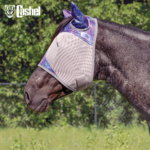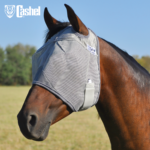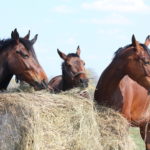Whatever your age when horses first entered your life, someone was probably there to usher you through the basics of both rudimentary care and riding. My first legitimate horse contact came late – in my 20s, but fate plunked me right down less than a mile from a horseman’s horseman. He quickly sized me up as being fervently clueless and from the start was astoundingly generous with both his time and knowledge.

I’d known him less than a week when the phone rang around midnight. I’d had a hard day trying to dig post holes in rocky pasture and had finally fallen asleep. When I picked up the receiver, it was Leonard. “What are your horses doing right now?” No greeting. I mumbled something like, “Uh, eating or sleeping?” He said, “The last thing you do before you brush your teeth and get into bed is check your horses.” And he hung up.
I dragged myself out to the barn – the dogs wouldn’t even get up – to find two drowsy horses blinking in the light. I split another flake of hay between them and patted their necks, feeling like an idiot. When I walked out of the barn there sat Leonard in his big old Chrysler. He flicked his high beams at me, backed out of my driveway and drove away. I’ve often wondered how long it would have taken me to earn his respect if I’d stayed in bed that night. And I thank him every day for this lesson.
Heart-Stopping Situations
Since then, my horses have never missed a barn bed check. Guilt and habit are not the only reasons. Here are just some of the things I’ve discovered over the years when making my final rounds:
Too many gas colics to even count. Yes, they might have all resolved by morning, but a dose of Banamine prevented many hours of rolling and pain.
- An ultimately fatal colic in my old stallion. Stoic as he was, I was able to make his last hours comfortable.
- A beloved broodmare aborting a 30-day-premature foal. She was a hydrops foaling, and when I opened the door at 11 p.m. only the foal’s lifeless head was hanging from her vulva and amniotic fluid was running out from under her door.
- My naughtiest gelding trashing the barn. He managed to pop the bolts in his stall latch by rubbing his large behind against the door. He’d pulled all the supplements off the shelf and helpfully mixed them up. He’d broken apart 4 bales of hay and scattered them in the aisle. He turned my barn radio into pieces the size of a guitar pick and bitten through the telephone wire. And for spite, he’d chewed all the training tack, with special emphasis on his personal bridle.
- A rabid raccoon curled up under my frost-free hydrant. In my myopic, somnolent state, I thought it was my deaf, grey tabby cat and bent over to pet it, until I realized at the last second Deaf Kitty was asleep in the house by the woodstove.
- Far too many empty water buckets that I’d forgotten to fill at dinner time.
- A filly pumping blood after somehow scalping the entire front of her face.
- My best and favorite mare (being treated for a mild mastitis) in shock and in severe respiratory distress with purpura hemorrhagica. Saving that mare alone makes every trip to the barn at night worthwhile.
Hay is Cheaper than Gastrogard
Disaster prevention is not my only motivating factor, however. If you’ve been a reader of Horse Journal for any length of time, you know we encourage care that closely mimics the horse’s natural environment. We’ve very strong on free-choice forage, while making concessions for insulin resistance and obesity with the use of muzzles and slow feeders.
You’ll probably also recall our articles on ulcer prevention and cribbing, both of which stress the need to keep that stomach full of roughage. Unlike people, who excrete most stomach acids only following food intake, the glandular portion of a horse’s stomach continues to pump out digestive enzymes even if nothing has been ingested. Without food to absorb those acidic enzymes, they accumulate and begin eroding the upper, non-glandular portion of the stomach resulting in ulcers.
Bed check allows you to furnish one more essential feeding of forage (and to top off those water buckets). Think you’ve given your horse plenty of hay to last the night? Just once, provide your horse with his normal dinner time ration and then go back to the barn an hour later. How much hay is left? The answer? None. Surprised? I was. Now calculate how many hours it will be before the horse has food in his stomach again. Scary, right? And all that time those busy little acidic enzymes are eating away at your horse’s stomach.
The Boarding Problem
So what can you do if your horse is stabled elsewhere and not in your back yard? You may be fortunate enough to have an enlightened barn manager who already makes a bed check and a generous feeding of late night hay. If not, you need to have a discussion. (Bring this article along.) Money talks, but so does bartering your time or talent. Perhaps a fellow boarder who rides late in the evening would be willing to throw your horse more hay just before she leaves. At the very least, on the days you are there, you can stuff a slow-feeder hay net and ask the manager to hang it with the last meal of the day.
There Are Rewards
Bed check will eventually become such a part of your horse care routine that you will not be able to sleep if you skip it. Use those few minutes of late-night solitude to remind yourself why you have horses at all. Introduce that young horse to the sound of running clippers. Give that old retiree a spa treatment to compensate for all the times he’s dropped to the bottom of your “to do” list. You’ll learn to love the quiet, unhurried atmosphere of a barn late at night.
In addition to the usual scurrying, nocturnal animals about, miracles abound. I’ve seen:
1. The Northern Lights
2. A total eclipse of the moon
3. A legion of fireflies
4. The Perseid meteor shower
5. A snowy owl
6. The international space station
I never cease to feel wonder.
I hope by presenting the health benefits to your horse I’ve now convinced you to make that late night trek to the barn. And I think I’ve shot holes in all your excuses not to do so. Tonight’s the night: Grab a jacket and your bunny slippers and get out there. You never know; I might be sitting in your driveway . . .
Article by Contributing Writer Beth Benard





